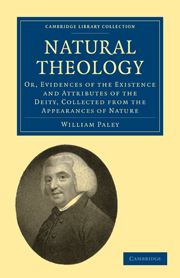 Natural Theology
Natural Theology Book contents
- Frontmatter
- Contents
- CHAP. I STATE OF THE ARGUMENT
- CHAP. II STATE OF THE ARGUMENT CONTINUED
- CHAP. III APPLICATION OF THE ARGUMENT
- CHAP. IV OF THE SUCCESSION OF PLANTS AND ANIMALS
- CHAP. V APPLICATION OF THE ARGUMENT CONTINUED
- CHAP. VI THE ARGUMENT CUMULATIVE
- CHAP. VII OF THE MECHANICAL AND IMMECHANICAL FUNCTIONS OF ANIMALS AND VEGETABLES
- CHAP. VIII OF MECHANICAL ARRANGEME'NT IN THE HUMAN FRAME—OF THE BONES
- CHAP. IX OF THE MUSCLES
- CHAP. X OF THE VESSELS OF ANIMAL BODIES
- CHAP. XI OF THE ANIMAL STRUCTURE REGARDED AS A MASS
- CHAP. XII COMPARATIVE ANATOMY
- CHAP. XIII PECULIAR ORGANIZATIONS
- CHAP. XIV PROSPECTIVE CONTRIVANCES
- CHAP. XV RELATIONS
- CHAP. XVI COMPENSATIONS
- CHAP. XVII THE RELATION OF ANIMATED BODIES TO INANIMATE NATURE
- CHAP. XVIII INSTINCTS
- CHAP. XIX OF INSECTS
- CHAP. XX OF PLANTS
- CHAP. XXI OF THE ELEMENTS
- CHAP. XXII ASTRONOMY
- CHAP. XXIII PERSONALITY OF THE DEITY
- CHAP. XXIV OF THE NATURAL ATTRIBUTES OF THE DEITY
- CHAP. XXV OF THE UNITY OF THE DEITY
- CHAP. XXVI THE GOODNESS OF THE DEITY
- CHAP. XXVII CONCLUSION
CHAP. XXIV - OF THE NATURAL ATTRIBUTES OF THE DEITY
Published online by Cambridge University Press: 07 September 2010
- Frontmatter
- Contents
- CHAP. I STATE OF THE ARGUMENT
- CHAP. II STATE OF THE ARGUMENT CONTINUED
- CHAP. III APPLICATION OF THE ARGUMENT
- CHAP. IV OF THE SUCCESSION OF PLANTS AND ANIMALS
- CHAP. V APPLICATION OF THE ARGUMENT CONTINUED
- CHAP. VI THE ARGUMENT CUMULATIVE
- CHAP. VII OF THE MECHANICAL AND IMMECHANICAL FUNCTIONS OF ANIMALS AND VEGETABLES
- CHAP. VIII OF MECHANICAL ARRANGEME'NT IN THE HUMAN FRAME—OF THE BONES
- CHAP. IX OF THE MUSCLES
- CHAP. X OF THE VESSELS OF ANIMAL BODIES
- CHAP. XI OF THE ANIMAL STRUCTURE REGARDED AS A MASS
- CHAP. XII COMPARATIVE ANATOMY
- CHAP. XIII PECULIAR ORGANIZATIONS
- CHAP. XIV PROSPECTIVE CONTRIVANCES
- CHAP. XV RELATIONS
- CHAP. XVI COMPENSATIONS
- CHAP. XVII THE RELATION OF ANIMATED BODIES TO INANIMATE NATURE
- CHAP. XVIII INSTINCTS
- CHAP. XIX OF INSECTS
- CHAP. XX OF PLANTS
- CHAP. XXI OF THE ELEMENTS
- CHAP. XXII ASTRONOMY
- CHAP. XXIII PERSONALITY OF THE DEITY
- CHAP. XXIV OF THE NATURAL ATTRIBUTES OF THE DEITY
- CHAP. XXV OF THE UNITY OF THE DEITY
- CHAP. XXVI THE GOODNESS OF THE DEITY
- CHAP. XXVII CONCLUSION
Summary
It is an immenfe conclufion, that there is a God; a perceiving, intelligent, defigning Being; at the head of creation, and from whofe will it proceeded. The attributes of fuch a Being, fuppofe his reality to be proved, muft be adequate to the magnitude, extent, and multiplicity of his operations: which are not only vaft beyond comparifon with thofe performed by any other power, but, fo far as refpects our conceptions of them, infinite, becaufe they are unlimited on all fides.
Yet the contemplation of a nature fo exalted, however furely we arrive at the proof of its exiftence, overwhelms our faculties. The mind feels its power fink under the fubject. One confequence of which is, that from painful abftraction the thoughts feek relief in fenfible images. From whence may be deduced the antient, and almoft univerfal, propenfity to idolatrous fubftitutions. They are the refources of a labouring imagination. Falfe religions ufually fall in with the natural propenfity: true religions, or fuch as have derived themfelves from the true, refift it.
It is one of the advantages of the revelations which we acknowledge, that, whilft they reject idolatry with its many pernicious accompaniments, they introduce the Deity to human apprehenfion, under an idea more perfonal, more determinate, more within its compafs, than the theology of nature can do.
- Type
- Chapter
- Information
- Natural TheologyOr, Evidences of the Existence and Attributes of the Deity, Collected from the Appearances of Nature, pp. 474 - 481Publisher: Cambridge University PressPrint publication year: 2009First published in: 1803


